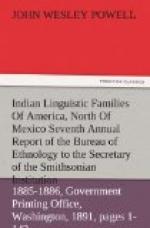UCHEAN FAMILY.
= Uchees, Gallatin in Trans. and Coll. Am. Antiq. Soc., II., 95, 1836 (based upon the Uchees alone). Bancroft, Hist. U.S., III., 247, 1840. Gallatin in Trans. Am. Eth. Soc. II., pt. 1, xcix, 77, 1848. Keane, App. Stanford’s Comp. (Cent. and So. Am.), 472, 1878 (suggests that the language may have heen akin to Natchez).
= Utchees, Gallatin in Trans. and Coll.
Am. Antiq. Soc., II., 306,
1836. Gallatin in Schoolcraft, Ind.
Tribes, III., 401, 1853. Keane,
App. Stanford’s Comp. (Cent.
and So. Am.), 472, 1878.
= Utschies, Berghaus (1845), Physik. Atlas, map 17, 1848. Ibid., 1852.
= Uche, Latham, Nat. Hist. Man,
338, 1850 (Coosa River). Latham in
Trans. Philolog. Soc. Lond.,
II., 31-50, 1846. Latham, Opuscula, 293,
1860.
= Yuchi, Gatschet, Creek Mig. Legend,
I, 17, 1884. Gatschet in
Science, 413, April 29, 1887.
The following is the account of this tribe given by Gallatin (probably derived from Hawkins) in Archaeologia Americana, page 95:
The original seats of the Uchees were east of Coosa and probably of the Chatahoochee; and they consider themselves as the most ancient inhabitants of the country. They may have been the same nation which is called Apalaches in the accounts of De Soto’s expedition, and their towns were till lately principally on Flint River.
GEOGRAPHIC DISTRIBUTION.
The pristine homes of the Yuchi are not now traceable with any degree of certainty. The Yuchi are supposed to have been visited by De Soto during his memorable march, and the town of Cofitachiqui chronicled by him, is believed by many investigators to have stood at Silver Bluff, on the left bank of the Savannah, about 25 miles below Augusta. If, as is supposed by some authorities, Cofitachiqui was a Yuchi town, this would locate the Yuchi in a section which, when first known to the whites, was occupied by the Shawnee. Later the Yuchi appear to have lived somewhat farther down the Savannah, on the eastern and also the western side, as far as the Ogeechee River, and also upon tracts above and below Augusta, Georgia. These tracts were claimed by them as late as 1736.
In 1739 a portion of the Yuchi left their old seats and settled among the Lower Creek on the Chatahoochee River; there they established three colony villages in the neighborhood, and later on a Yuchi settlement is mentioned on Lower Tallapoosa River, among the Upper Creek.[99] Filson[100] gives a list of thirty Indian tribes and a statement concerning Yuchi towns, which he must have obtained from a much earlier source: “Uchees occupy four different places of residence—at the head of St. John’s, the fork of St. Mary’s, the head of Cannouchee, and the head of St. Tillis” (Satilla), etc.[101]




